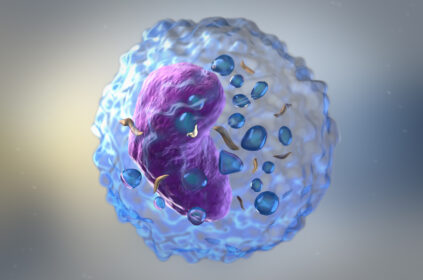Metastatic cancer can be challenging to treat. The Phase 2 CRDF-004 clinical study is exploring a potential therapeutic option for patients with RAS-mutated metastatic colorectal cancer (mCRC). Within the study, researchers are exploring a combination treatment of onvansertib alongside the standard-of-care (FOLFIRI plus bevacizumab or FOLFOX plus bevacizumab) is more effective than the standard-of-care on its own. This is especially important as there have been no new approved therapies for RAS-mutated metastatic colorectal cancer over the last 20 years.
According to a news release from Cardiff Oncology, the first patient was dosed in the clinical study in late February/early March 2024. Altogether, 90 individuals will participate in the study, all of whom have either KRAS-mutated or NRAS-mutated metastatic colorectal cancer.
The goal of this study is to determine how safe and effective the combination treatment is, the overall response rate, how well ovansertib improves progression-free survival, and what dose should be used for a future Phase 3 study. This study will examine 20mg or 30mg onvansertib in conjunction with the standard-of-care.
What is Colorectal Cancer?
Also known as: Stage IV colorectal cancer
Colorectal cancer typically begins as a polyp (a growth) in the lining of the colon or rectum. These often start as benign (non-cancerous) but can become cancerous over time. Doctors don’t know exactly what causes colorectal cancer, but they have identified risk factors. These include being older in age, being of African-American descent, having a personal history of cancer/polyps or a family history of colorectal cancer, being obese, smoking, having diabetes, alcohol use, inactivity, and a low-fiber, high-fat diet.
If left untreated, cancer cells from the primary tumor can break away and spread (metastasize) to other areas of the body such as the liver, lungs, bones, or other organs. Symptoms may include losing weight without trying, fatigue, weakness, bloody stool or rectal bleeding, a persistent change in bowel habits, and the feeling of the bowels not emptying completely.
RAS-Mutated Colorectal Cancer
RAS-mutated metastatic colorectal cancer refers to a specific subtype of colorectal cancer which involves RAS gene mutations (KRAS, NRAS, HRAS). These mutations activate signaling pathways involved in cell growth and proliferation. This can lead to cancer if these pathways become dysregulated. An estimated 40-50% of metastatic colorectal cancer cases are associated with RAS mutations. These mutations are associated with poorer treatment outcomes and treatment resistance, as well as a worse prognosis.
clinical trial colorectal cancer medical research metastatic colorectal cancer oncology
Last modified: April 9, 2024











